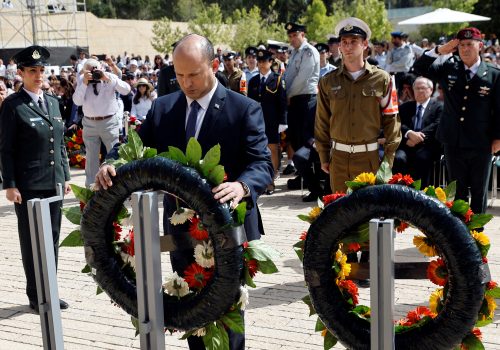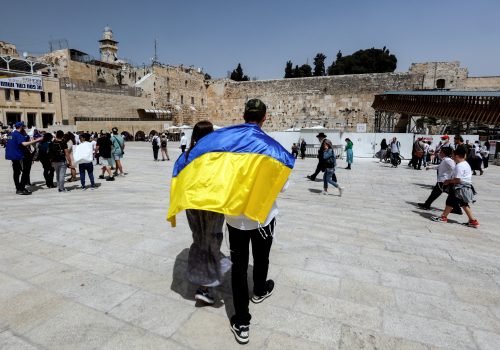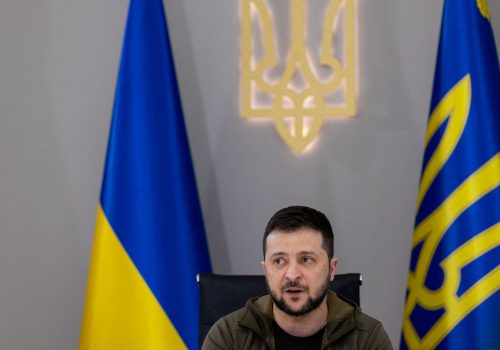Until Israel deals with the Israeli-Palestinian conflict, it can’t lead in the region
As the United States reconsiders the scale of its presence in the Middle East, local partners and allies are raising their diplomatic ambitions. Israel is now in the unprecedented position of playing an active role in defining the new regional security architecture. If this development is good news for Israel and the US, it comes with two old challenges: an Israeli diplomatic apparatus insufficiently manned to cope with the exigencies of such a regional role, and a persisting Palestinian crisis that will keep undermining the rise of Israel as a contributor to that new regional order. This Israeli conundrum is vividly displayed by the country’s diplomacy under the premiership of Naftali Bennett.
After replacing Benjamin Netanyahu in June 2021, Bennett first enjoyed several diplomatic successes. In particular, he presided over the deepening of Israel’s ties with its new Arab partners, namely the United Arab Emirates (UAE), Bahrain, and Morocco. In the fall of 2021, Foreign Minister Yair Lapid and Defense Minister Benny Gantz traveled to Morocco within less than three months. In January, Israel’s national anthem was played inside the UAE’s Presidential Palace during President Isaac Herzog’s visit to Abu Dhabi.
Consultations between Israel’s government officials and their Arab counterparts weren’t mere diplomatic scenery. They led to military cooperation, including naval drills between the Israelis, Emiratis, and Bahrainis alongside the US Navy. They also involved a surge in arms sales: just one year after the signing of the Abraham Accords, these countries represented 7 percent of Israel’s defense exports in 2021, with government officials projecting a further increase.
At the same time, Israel and Turkey initiated a long-overdue reconciliation process following President Herzog’s visit to Ankara in March 2021. The decade-long dispute between both countries emerged after Turkish President Recep Tayyip Erdogan’s rebuke of Israel’s operation in Gaza in 2008, and reached a nadir following the incident of the Mavi Marmara flotilla in 2010. The ongoing rapprochement could reinvigorate bilateral trade while causing Turkey to distance itself from Islamist groups, such as militant group Hamas in the Gaza Strip.
Finally, the March Negev Summit gathering of the foreign ministers of Egypt, the UAE, Bahrain, Morocco, and the US in Israel represented the culminating point of that normalization momentum. Holding an event of that scale was a success For Bennett and his government and one that they are counting on sustaining, as Israel announced the Negev Summit would become an annual gathering rotating between the countries.
All in all, if the idea of Israel playing a central role in regional consultations may have sounded farfetched a few years ago, the latest trends in the Middle East are giving tangible texture to the scenario.
However, Israeli policymakers face two very distinct challenges to achieve this goal. First, Israel’s foreign policy successes remain heavily centered on military and intelligence cooperation. It’s no secret that Israel’s foreign ministry is underfunded and too often sidelined in major foreign policy matters by the prime minister’s office and the Israeli Defense Forces.
This isn’t a mere bureaucratic issue. Military and intelligence agencies tend to look for short-term measures to address common threats while diplomats search for longer-term solutions involving a viable cooperation framework. Historically, Israel’s military-centric policy towards African or Arab partners implied discreet, if not clandestine, cooperation that hardly strengthened its public regional standing. Therefore, if Israel seriously envisions its role as a contributor, if not a leader, of regional consultations, it needs to provide greater responsibilities and resources to its diplomatic corps. Such an approach would enable a widening of the scope of the current Israeli partnerships that remain narrowly defined by a common desire to balance Iran’s threat. Diplomats, not soldiers, can design and sustain a regional order that relies on regular dialogs, mechanisms to settle disputes, and joint economic projects.
Second, Israel’s credibility as a contributor to the regional order will be influenced by its ability to manage the Palestinian issue. In early April, Israel’s foreign policy achievements, epitomized by the Negev Summit, were overshadowed by a series of terrorist attacks in the country. One such attack took place as the Negev Summit was underway on March 27, drawing condemnations from all assembled foreign ministers. But the shock and emotion triggered by the events forced the government to refocus its agenda on the domestic front and led Bennett to approve a military raid on the city of Jenin in the north of the West Bank. Coinciding with Passover and Ramadan holidays, events escalated, with clashes in Jerusalem between Jews and Arabs, which drew a stern Israeli police response.
The violence at the Temple Mount in Jerusalem, regardless of its origins, demonstrated the site’s sensitivity, even among Israel’s new Arab partners. Several publicly condemned Israel’s treatment of the Palestinians. The UAE, arguably the closest new Arab friend of Israel, issued a “strong protest and denunciation” of the events and a rumored contribution of two of its airlines, which were initially scheduled to participate in the flyover for Israel’s Independence Day on May 5, was scrapped.
For the time being, the sudden crisis in Jerusalem and the West Bank seems unlikely to ignite a new war such as the one in May 2021. Rockets were fired on Israel’s territory from the Gaza Strip, but no group claimed responsibility and Hamas seemingly called on armed factions to avoid such attacks, even as its leaders continue to urge individual Palestinians to conduct stabbing and shooting attacks. However, the absence of a new full-scale conflict is less the result of diplomatic efforts than Hamas’ reluctance to launch an all-out war only one year after the last round.
Those tensions are nothing new and, therefore, merely act as a reality-check: the Israeli-Palestinian conflict may no longer be the Middle East’s center of gravity like before, but its continuation still hinders the ability of Jerusalem to expand its regional outreach. Neglecting the Palestinian issue will eventually prevent Israel from becoming a contributor to the new Middle East order.
Admittedly, in the current political environment, whether in Jerusalem, Ramallah, or Gaza, it is unrealistic to envision an Oslo-like peace process. But, absent a resolution to the conflict, Israel should find a way to prevent low-intensity clashes from escalating into another conflict with Hamas (four have already been fought since 2008).
A new approach is needed that combines the current defense posture vis-a-vis Hamas with a set of policies to decrease the incentives for Palestinians to join extremist groups. This could be achieved by economic measures, such as the latest increase in work permits for Palestinians inside Israel, which provides them with job opportunities while reducing the flow of illegal entries. At the same time, Israel could revive diplomatic talks with the Palestinian Authority with the support of Turkey, Egypt, and Gulf states like the UAE. Rather than choosing between the Palestinian issue and its regional policy, Israel would, in fact, use its new partnerships to improve the conditions in Gaza and the West Bank.
As Israel raises its regional ambitions, it shouldn’t ignore these two obstacles that, in their distinct ways, have been undermining its foreign policy efforts for decades. There is undoubtedly an opportunity for Israel to seize in the new Middle East environment. The normalization momentum launched by the Abraham Accords could finally lead the Jewish State to not just co-exist with its Arab neighbors, but participate alongside those countries in defining the terms of a regional security architecture. It’s in the interests of Israel and the United States to achieve that goal.
Jean-Loup Samaan is a senior research fellow at the Middle East Institute of the National University of Singapore and a former policy advisor for the French Ministry of Armed Forces and NATO.
Further reading
Thu, Apr 28, 2022
Israel’s PM gave a Holocaust Remembrance speech without mentioning Iran. It signals a new approach.
MENASource By Daniel B. Shapiro
Naftali Bennett signals confidence that Israel will be vigilant and strong. That confidence grows out of more than just a different philosophical approach.
Wed, Apr 13, 2022
Israel won’t stick out its neck for Ukraine. It’s because of Russia.
MENASource By David Daoud
Over the last decade, regional developments have forced Israel to balance its moral sense regarding the Russia-Ukraine conflict against its vital national interests.
Wed, Apr 6, 2022
Zelenskyy wants Ukraine to be ‘a big Israel.’ Here’s a road map.
New Atlanticist By Daniel B. Shapiro
By adapting their mindset to mirror aspects of Israel’s approach to security challenges, Ukrainian officials can tackle their own critical challenges with confidence.
Image: Israel?s Foreign Minister Yair Lapid and U.S. Secretary of State Antony Blinken visit Ben-Gurion's Tomb National Park, near Sde Boker, Israel March 28, 2022. Jacquelyn Martin/Pool via REUTERS


